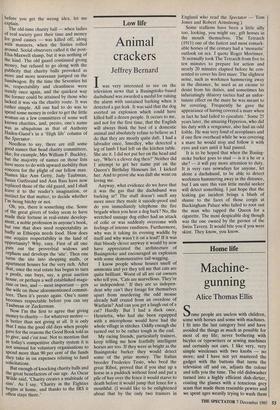High life
High-
Taki
his is the time of year that New York mantelpieces begin to resemble my friend Charles Benson: groaning under the strain, stuffed to the gills, and about to collapse. There are more cocktail parties, dinners, openings, and charity ball invitations arriv- ing than there are spies in Washington, and I can only thank God I'm neither a postman, nor a professional socialite — which a large majority of the rich in Manhattan seem to be.
For reasons unknown, this year has been more hectic than ever before. Hostesses are in the kind of frenzy not seen in these parts since the days of the flap and the backlash it provoked from those who never made it down to the nation's capital to meet Chuck and Di. Personally, I suspect it has more to do with the fact that money is what New York social life is all about, money and promotion, that is, and the season before Christmas offers the kind of opportunity to those who wish to promote themselves, just as, say, shooting innocent and unarmed people helps bearded types in the Middle East.
Mind you, most of the entertaining is done in the name of sweet charity, and the great social lionesses of today are those whose husbands swing with the kind of bread only real-estate speculators can come up with. In fact, charity in the Eighties has done for social climbing what the bed once did for the hooker. But before you get the wrong idea, let me explain.
The old-time charity ball — when ladies of real society gave their time and money for good causes — was killed off, along with manners, when the Sixties rolled around. Social observers called it the post- Elsa-Maxwell slump, but it was nothing of the kind. The old guard continued giving money, but refused to go along with the publicity that charity balls provoked as more and more nouveaux jumped on the bandwagon. By the time the Seventies hit us, respectability and cleanliness were trendy once again, and the quickest way the former could be attained by those who lacked it was via the charity route. It was rather simple. All one had to do was to spend some money in order to get the little woman on a few committees of some well known charities, and, presto, one's name was as ubiquitous as that of Anthony Haden-Guest's in a 'High life' column of the Spectator.
Needless to say, there are still some good names that head charity committees, like, for example, Mrs William F. Buckley, but the majority of names on those lists have more to do with upward mobility than concern for the plight of our fellow man. Names like Ann Getty, Judy Taubman, Susan Gutfreund and Ann Bass have now replaced those of the old guard, and I shall leave it to the reader's imagination, or Instinct for that matter, to decide whether m being bitchy or not. Oh, yes, there is something else. Some of the great givers of today seem to have made their fortune in real-estate develop- ment, a noble profession in anyone's book, but one that does need respectability as badly as Ethiopia needs food. How does one acquire respectability in the land of °PPortunity? Why, easy. First of all one Puts out the proverbial widows and Orphans and develops the 'site'. Then one turns the site into shopping malls, or apartment houses for the very rich. After that, once the real estate has begun to turn a profit, one buys, say, a great auction house, or perhaps a well established maga- zine or two, and — most important — gets the wife on those aforementioned commit- tees. Then it's presto again. One's name becomes respectable before you can say Taubman or Zuckerman.
Now I'm the first to agree that giving money to charity — for whatever motive is better than not giving at all. It is only that I miss the good old days when people gave for the reasons the Good Book told us to give, and c'est tout. Not to mention that in today's competitive charity system it is not unusual for voluntary organisations to spend more than 90 per cent of the funds they take in on expenses relating to fund solicitations.
But enough of knocking charity balls and the great benefactors of our age. As Oscar Wilde said, 'Charity creates a multitude of sins'. As I say, 'Charity in the Eighties begins at home, and thanks to the IRS it often stays there.'



































































 Previous page
Previous page